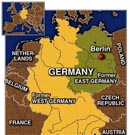Germany marks 70th anniversary of pogrom against Jews
 Berlin - Flames leaped into the sky across Germany when the Nazis gave a foretaste of the Holocaust in a vicious pogrom against the Jewish community on the night of November 9, 1938.
Berlin - Flames leaped into the sky across Germany when the Nazis gave a foretaste of the Holocaust in a vicious pogrom against the Jewish community on the night of November 9, 1938.
By the time the rampage had ended, thousands of Jewish homes, businesses and synagogues had been burned down or looted by thugs as police and fire brigades looked on.
The event came to be known as Kristallnacht, or Night of Broken Glass, a reference to the shattered windows of storefronts that carpeted German streets.
"Everything said about it is harmless compared to the reality of what actually happened," said one Berlin woman whose recollections are documented at the Central Jewish Information Office.
Another witness from Dusseldorf described how Jews, "dragged from their beds in pyjamas and nightgowns," were forced "to walk through the broken glass without any footwear."
More than 400 people were beaten to death, shot or driven to suicide, records show. More than 30,000 were rounded up and packed off to concentration camps.
The tyranny marked a turning point in the anti-Semitic policies pursued after Hitler took power in 1933 and which eventually led to the Holocaust, the systematic state-sponsored killing of Jews.
Germany's parliament adopted a resolution against anti-Semitism to mark Sunday's 70th anniversary of the pogrom after a dispute over whether a far-left party should be included.
Chancellor Angela Merkel's Christian Democrats lobbied to have The Left excluded because of its cooperation with "extremists hostile to Jews" - a reference to the Palestinian movement Hamas.
Merkel herself will represent the government at a remembrance ceremony held together with the Central Council of Jews in Germany at the country's largest synagogue, located in Berlin.
Built in 1904, the Ryke Street synagogue was badly damaged in the 1938 pogrom, but was not burned down, apparently because the Nazis feared damage would be caused to adjacent buildings.
It was reopened in August 2007 after being restored to its original glory at a cost of 7 million dollars.
Some 600,000 Jews lived in Germany before the war, but the figure declined to around 12,000 after 1945. Today, there are more than 110,000 Jews or people of Jewish origin, giving Germany one of the largest Jewish populations of any country in Europe.
Despite a revival of Jewish culture, there is a growing mood of anti-Semitism in Germany, according to the German-Israeli Society, which held its annual meeting over the weekend.
Figures disclosed by the government on Tuesday showed there were nearly 800 anti-Semitic crimes committed during the first nine months of this year, resulting in injuries to 27 people.
Among the events is being held in Berlin and other cities to mark the anniversary of the pogrom is an exhibition called "It's Burning - Anti-Jewish Terror in 1938."
The display at the capital's Neue Synagogue contains little known photographs that underscore the extent of the violence and the public humiliation of Jews during the Third Reich.
At the same time, the first museum to honour Germans who helped Jews survive Nazi persecution during the Holocaust has just opened in central Berlin.
On show are photographs, letters and other documents from more than 250 "silent heroes" who risked their lives by providing food, shelter and other assistance to Jews from 1938-45.
Seven decades on, an Israeli journalist has been sifting for remnants of the Night of Broken Glass in a rubbish dump an hour's drive northeast of Berlin in the German state of Brandenburg.
Following a tip from locals, Yaron Svoray, 54, discovered a bottle imprinted with a Star of David and part of a backrest that might have been used in synagogues around that time.
Experts are expected to be called in to investigate the site in Schorfheide, where Hitler's designated successor, Hermann Goering, maintained his country residence. (dpa)